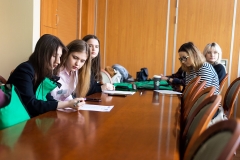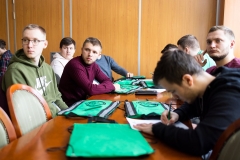GLOCAL International Summer School has started
05-04-2022
Back in 2019, Bialystok University of Technology (as the leader), Technical University of Madrid (UPM) and Klaipeda State University of Applied Sciences formed a consortium under the Strategic Partnerships in Higher Education action of the Erasmus+ Programme. Together they are implementing a project called “GLOCAL – Innovative training of future engineers responding to problems of contemporary cities”. Its main objective is to introduce modernisation to the curricula of technical studies conducted at partner universities, in particular to broaden students’ knowledge and skills in the field of shaping public spaces and raising the standard of living in cities.
The most important project outcome is the organisation of international summer schools. The first one consists of on-site classes at the Faculty of Civil Engineering and Environmental Sciences of Bialystok University of Technology and the Technical University of Madrid in Spain (between two parts of on-site classes students will undergo a 3-week e-learning course). The second summer school involves students visit to the Lithuanian University, followed by an online course and then a visit in Spain. The dates of both summer schools were postponed due to the pandemic. Finally, it worked out and on 4 April 2022, students from Poland, Lithuania and Spain met in Bialystok.
At the Faculty of Civil Engineering and Environmental Sciences of Bialystok University of Technology, the students were welcomed by the University and Faculty authorities. The Rector, Assoc. Prof. Marta Kosior-Kazberuk, DSc, PhD, Eng wished the participants of the summer school great experience and a successful stay in Bialystok. She stressed that such summer schools are a unique form of developing international cooperation, a chance to get to know other universities, teachers, students and finally countries. The Vice-Rector for International Cooperation, Assoc. Prof. Dorota Anna Krawczyk, DSc, PhD, Eng, spoke about mutual inspiration and good cooperation in international project groups. The participants of the summer school were also welcomed by Małgorzata A. Lelusz, PhD, Eng, Vice Dean for Student Affairs and Education, and Katarzyna Kalinowska-Wichrowska, PhD, Eng, Vice Dean for Development and Cooperation, Faculty of Civil Engineering and Environmental Sciences.
A total of 24 students from engineering faculties (8 from each partner university) will participate in the GLOCAL summer school. These are persons who went through the recruitment process at their home universities. During the two weeks spent at Bialystok University of Technology they will participate in lectures, laboratories and workshops (until the 15th of April). In international interdisciplinary groups, they will design objects serving the local community, such as green bus stops, pocket parks and playgrounds.
– An assessment of the technical graduates’ skills to date has revealed a lack of competence in working together in multi-discipline teams on complex interdisciplinary projects. An example of such projects may be those leading to the improvement of the quality of life in the city. Their creators have to take into account the complex conditions of location, technical, social, legal, ecological, cultural heritage protection, image and brand building, etc. This is what we want to teach our students – creative action and cooperation in interdisciplinary and international teams – so that, while acting locally, they think globally, says Dorota Gawryluk, PhD, Eng, Arch. from the Faculty of Civil Engineering and Environmental Science of Bialystok University of Technology, coordinator of the GLOCAL project.
The programme of the GLOCAL Summer School also includes study visits to, among others, Dörken Delta Folie sp. z o. o. in Warsaw, where students will see the implementation of green roofs, and to FPP Enviro, a company specialising in the production of green bus stops. During a walk around Bialystok, students will see local realisations of green bus stops. They will also visit Suprasl and, weather permitting, the Sliwno-Waniewo footbridge over the Narew floodplains. After their stay at Bialystok University of Technology, students will return to their home universities, where they will undergo a 3-week e-learning course. They will meet again after the summer holidays at the university in Madrid.
The classes for the summer school students will be conducted by teachers representing all three partner universities of the GLOCAL project. They will be based on methodological ideas and didactic materials developed much earlier during project workshops for a total of 24 academic teachers from Poland, Lithuania and Spain.
The result of the cooperation between the educators is, among other things, the monograph “The Future of the City”, edited by Dorota Gawryluk, PhD, Eng, Arch. and Assoc. Prof. Dorota Anna Krawczyk, DSc, PhD, Eng by the Publishing House of Bialystok University of Technology in 2021.
– The monograph reflects work of the educators who were involved in the GLOCAL project. So we have here the topics of the protection of cultural heritage, accessibility of the city and the use of green and blue infrastructure to improve the standard of living of inhabitants, explains Dorota Gawryluk, PhD, Eng, Arch.
The book can be used as an academic textbook and a valuable supplement to content taught to students of landscape architecture, spatial management, civil engineering, environmental engineering, architecture, etc. It can also serve designers, contractors, regional and local government officials, or social organisations concerned with sustainable urban development and its future. The Future of the City” can be downloaded free of charge from the website of the Publishing House of Bialystok University of Technology or from the POLONA DIGITAL LIBRARY and ACADEMICA.
All teaching materials (course syllabus, e-learning materials, e-laboratories, professional e-dictionary in 4 languages, book and good design practice guide in e-book version) will be made available free of charge on the GLOCAL website.
In the future, the innovative GLOCAL module will be integrated into the curricula of the partner universities and offered to students from different universities as an optional subject (6 ECTS). Implementation of this module will increase the attractiveness of technical studies, complement the curriculum with modern ICT achievements, link teaching with practical aspects responding to the needs of the European labour market.
The Glocal project is implemented by the Faculty of Civil Engineering and Environmental Sciences together with Universidad Politecnica de Madrid (Spain), Klaipedos Valstybine Kolegija (Lithuania), with the support of many companies and enterprises from these two countries. The project has received funding of EUR 300,860 from the Erasmus+ programme, under KA2 ‘Cooperation for innovation and the exchange of good practices’, Strategic Partnerships in Higher Education.
by mr







